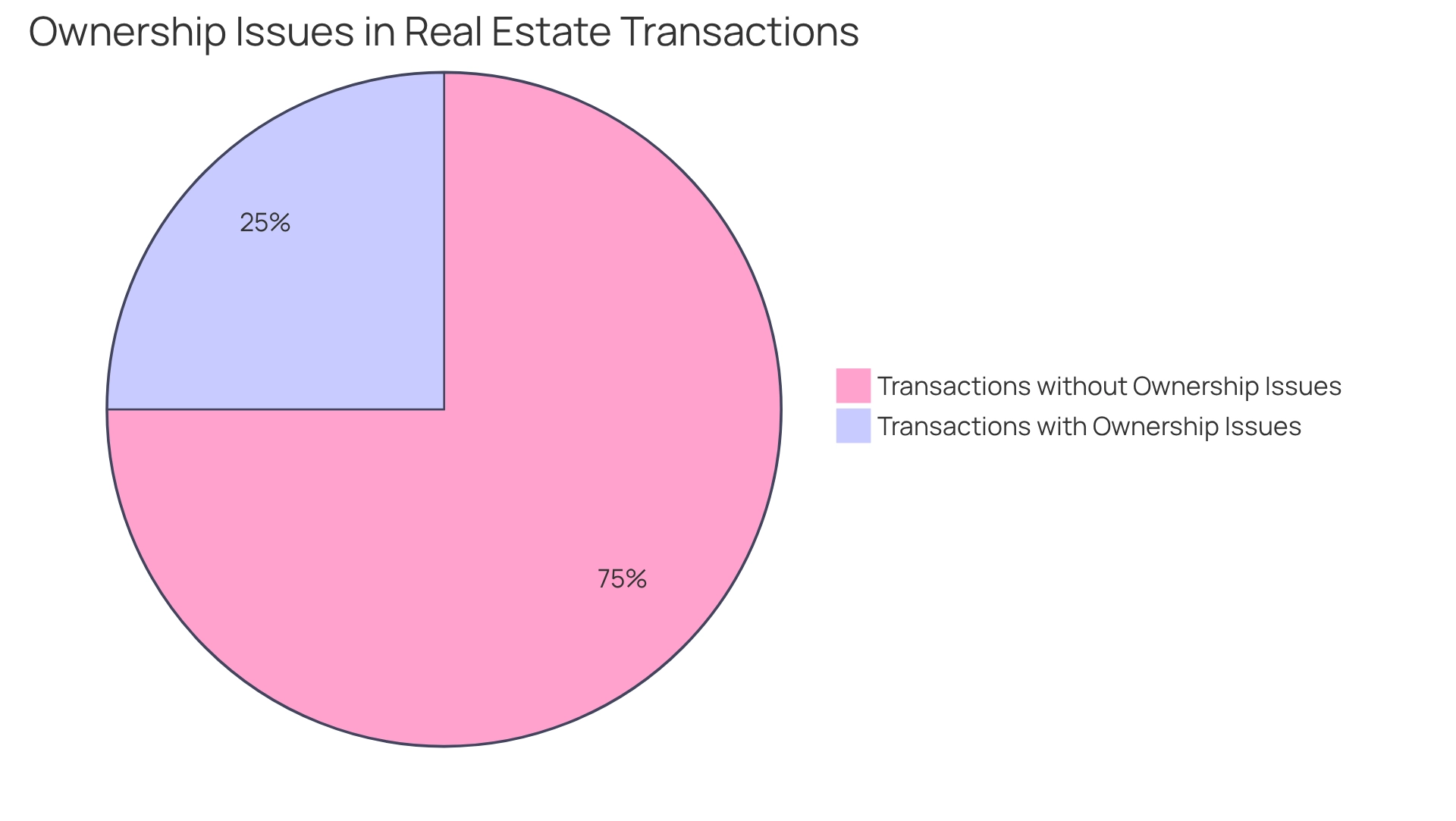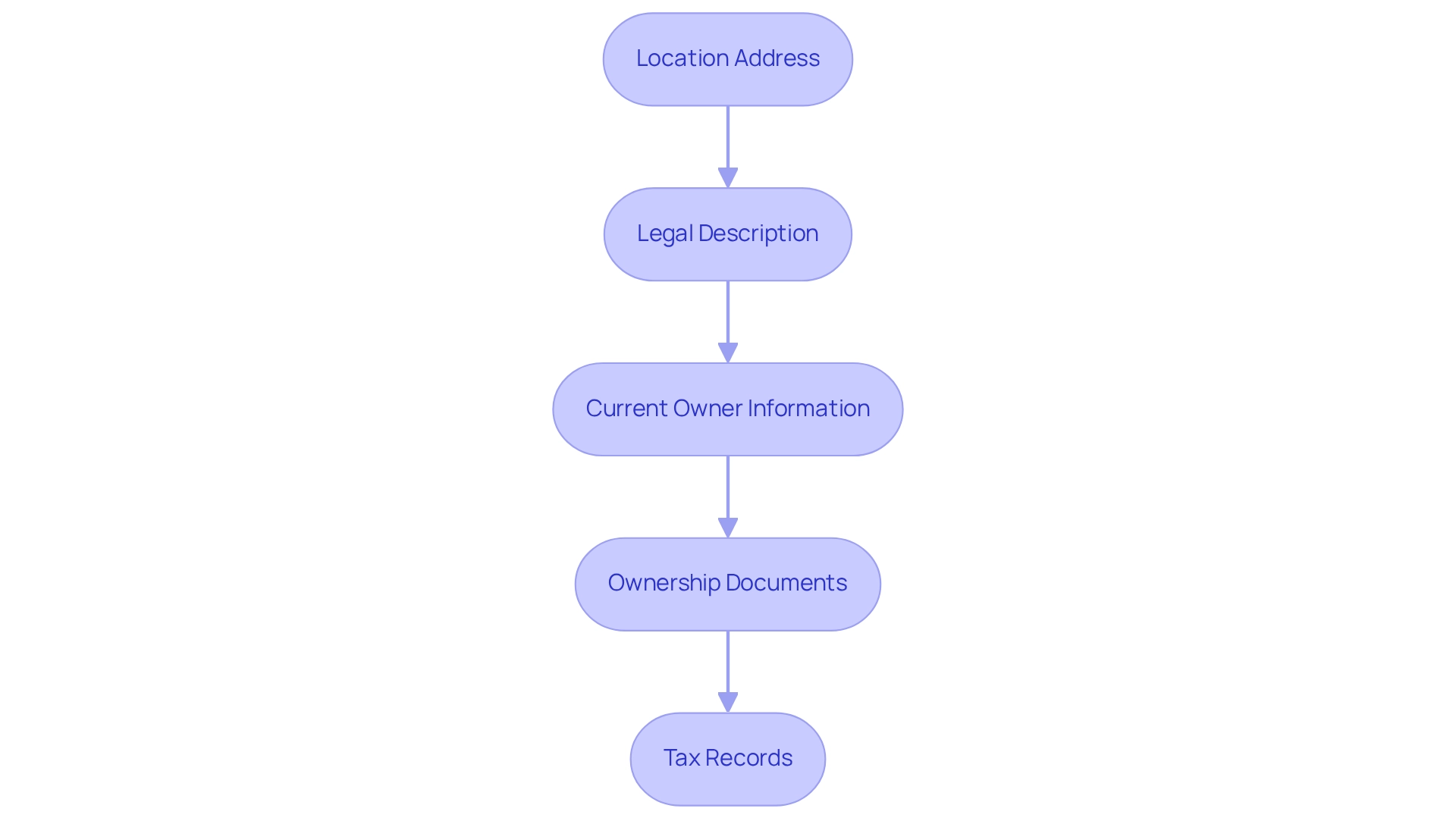Overview
The article delineates four essential steps for executing a successful preliminary title search.
- First, it emphasizes understanding the purpose of the search, which is crucial for establishing a solid foundation.
- Second, gathering necessary information and documents is vital to ensure comprehensive coverage.
- Third, conducting the title search using available resources allows for thorough exploration of potential issues.
- Lastly, identifying and resolving common title issues is imperative to prevent ownership disputes.
Each step is bolstered by practical advice and relevant statistics, underscoring the importance of thoroughness in facilitating smooth real estate transactions.
Introduction
In the intricate world of real estate transactions, the preliminary title search stands as a critical safeguard, ensuring that buyers and sellers navigate the complexities of property ownership with confidence. This essential process not only verifies legal ownership but also uncovers potential pitfalls that could derail a deal, such as liens, encumbrances, or ownership disputes.
Furthermore, statistics reveal that a significant portion of transactions face title issues, underscoring the necessity for real estate professionals to master the art of conducting thorough title searches. By gathering the right information, utilizing advanced tools, and addressing common title challenges, stakeholders can streamline the transaction process and protect their investments from unforeseen complications.
Understand the Purpose of a Preliminary Title Search
A preliminary title search is a critical component of the real estate transaction process, primarily aimed at confirming the legal ownership of an asset and identifying any potential issues that could impact the transaction. This process involves uncovering liens, encumbrances, or disputes related to the asset. For instance, cases have shown that invalid deed signatures can result in significant disputes over ownership rights, particularly when signatures are unauthorized or obtained under duress, such as with elderly individuals facing cognitive challenges. Such scenarios underscore the necessity of meticulous validation during real estate dealings.
Statistics reveal that approximately 25% of real estate transactions encounter ownership issues, highlighting the importance of conducting a thorough preliminary title search. By investing time and resources into this vital phase, real estate professionals can ensure that properties are devoid of legal complications, facilitating smoother transactions. As highlighted by industry experts, "Consequently, it is essential to prioritize a thorough document review to safeguard all parties involved in the transaction." This proactive approach not only protects investments but also enhances the overall efficiency of .

Gather Necessary Information and Documents
Gathering all necessary information and documents is essential to conduct a successful preliminary title search. This process begins with the following key components:
- Location Address: The complete address of the real estate in question.
- Legal Description: A detailed legal description of the property, which can often be found in previous deeds or tax records.
- Current Owner Information: Details about the current owner, including their name and any previous ownership records.
- Ownership Documents: Any existing ownership documents, such as previous ownership insurance policies or deeds.
- Tax records provide information regarding property taxes, including any outstanding taxes or assessments, and are crucial for a to enable a more effective examination process. Consequently, you can swiftly identify any potential issues that may arise.

Conduct the Title Search Using Available Resources
Once you have gathered all necessary information and documents, you can begin conducting the title search. Follow these essential steps:
- : Visit your local county recorder's office or their online portal to access public records associated with the land. Look for the deed, tax records, and any recorded liens of the asset.
- [Utilize Title Examination Software: Consider using Parse AI's advanced machine learning tools and title examination software, which streamline the process by providing access to multiple databases and employing powerful automation to identify issues more quickly and accurately.
- Look Up by Owner Name and Property Address: Perform inquiries using both the property address and the current owner's name to ensure comprehensive results. This dual approach aids in revealing any discrepancies or extra claims, utilizing the full-text retrieval capabilities of Parse AI's platform.
- Review Findings: Thoroughly examine all results from your inquiries. Take note of any liens, easements, or other encumbrances that may influence the property’s ownership. With Parse AI's document processing capabilities, you can efficiently assess and extract essential information from ownership documents, ensuring a comprehensive review.
By following these steps and utilizing the advanced tools available through Parse AI, you can effectively carry out a detailed examination and identify any potential issues that may arise.
Identify and Resolve Common Title Issues
After completing a preliminary title search, encountering several common title issues that require resolution is likely. Addressing these issues swiftly is vital for ensuring a seamless process. The following outlines typical challenges and strategies for resolving them:
- Liens: Discovering liens, such as unpaid taxes or contractor claims, necessitates immediate action. Engage with the lienholder to negotiate payment or settlement options. Statistics indicate that unresolved liens can significantly delay transactions, making timely resolution essential. The Florida Supreme Court in Casa Clara described the economic loss rule as 'the fundamental boundary' between contract law and tort law, underscoring the importance of resolving these issues promptly to avoid legal complications.
- Discrepancies in Ownership: If ownership records show discrepancies, compile supporting documentation to clarify the situation. This may involve reaching out to previous owners or obtaining affidavits. Real estate attorneys emphasize the importance of conducting a preliminary title search and thorough documentation to prevent future disputes. As David L. Boyette observed, the ruling that victims of torts by insurance agents cannot sue insurers maintains the statutory structure for regulation of insurers, emphasizing the necessity for thoroughness in research.
- Easements: When easements affecting the property are identified, understanding their implications fully is vital. Consulting with a real estate attorney can help negotiate terms or seek modifications, ensuring that your rights are protected.
- Ownership Insurance: Acquiring ownership insurance is a wise measure to protect against unexpected problems that could arise after acquisition. This insurance not only provides peace of mind but also financial protection against potential claims. Case studies indicate that insurance companies are held accountable for the actions of their representatives under specific statutory provisions, ensuring protection for clients against financial misconduct, such as in instances of escrow theft.
By proactively identifying and addressing these common issues related to insurance, you can facilitate a smoother transaction process and effectively protect your investment. Additionally, must be cautious not to exceed their authority, as doing so may lead to criminal prosecution for unauthorized practice of law.
Conclusion
A thorough preliminary title search is essential in the real estate transaction process, serving as a critical safeguard for both buyers and sellers. By verifying legal ownership and uncovering potential issues such as liens and encumbrances, this process not only protects investments but also enhances the overall efficiency of transactions. With statistics indicating that a significant percentage of real estate deals encounter title issues, the importance of conducting a detailed title search cannot be overstated.
Gathering the necessary information and utilizing advanced tools, such as title search software, streamlines the search process and helps identify potential complications early on. Addressing common title issues, including liens and discrepancies in ownership records, is vital to ensuring a smooth transaction. Proactive measures, such as obtaining title insurance, further safeguard against unforeseen problems that may arise after the purchase.
Ultimately, mastering the art of conducting comprehensive title searches is indispensable for real estate professionals. By prioritizing this critical step, stakeholders can navigate the complexities of property ownership with confidence, fostering a more secure and efficient real estate market.
Frequently Asked Questions
What is a preliminary title search?
A preliminary title search is a critical step in the real estate transaction process that confirms the legal ownership of a property and identifies any potential issues, such as liens, encumbrances, or disputes related to the asset.
Why is a preliminary title search important?
It is important because approximately 25% of real estate transactions encounter ownership issues. Conducting a thorough preliminary title search helps ensure that properties are free of legal complications, facilitating smoother transactions.
What types of issues can a preliminary title search uncover?
A preliminary title search can uncover issues such as liens, encumbrances, disputes over ownership rights, and problems related to invalid deed signatures, particularly those obtained under duress or from individuals with cognitive challenges.
What is the impact of ownership disputes in real estate transactions?
Ownership disputes can lead to significant complications in real estate transactions, potentially resulting in legal challenges and delays. This emphasizes the necessity for meticulous validation during the process.
How can a thorough document review benefit real estate transactions?
A thorough document review protects all parties involved in the transaction, safeguards investments, and enhances the overall efficiency of the real estate process.




